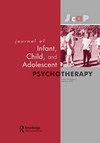Caregiver Mentalizing and Child Emotional Regulation: A Novel Approach to Examining Bidirectional Impact
Q3 Psychology
Journal of Infant, Child, and Adolescent Psychotherapy
Pub Date : 2023-11-14
DOI:10.1080/15289168.2023.2274200
引用次数: 0
Abstract
ABSTRACTMentalization theory suggest bidirectional links between a caregiver’s capacity to mentalize their child and emotional regulation in their children. However, there has been little empirical investigation to verify this theory. The bidirectional relationship between caregiver mentalizing and child emotional regulation may be especially important to understand in caregiving contexts where there is greater risk of relationship breakdown or child emotional dysregulation, such as in fostering relationships. This study used a novel time-sequence analysis approach to explore the putative bidirectional relationship between caregiver mentalizing and child emotional regulation in the context of long-term foster care. Existing theories about caregiver mentalizing and child emotional regulation were evaluated and developed by looking at moment-by-moment interactions between a foster carer and a child in her care. The findings of this study gave mixed support for bidirectional relationships between foster carer mentalizing, and child emotional regulation predicted by existing theoretical models. These findings have implications for refining and applying mentalization theory broadly and more specifically in the context of foster care. Furthermore, this study provides a useful example of how time-sequence analysis may be useful for exploring the links between phenomena, such as caregiver mentalizing and child emotional dysregulation, occurring over time in observational data. AcknowledgmentsWe would like to thank Ruth and Alex for their generous participation in this study. The data used in this study comes from the Relationship Stories study which was conceived and designed by Nick Midgley, Karen Irvine, Jamie Murdoch, Zena Louise Richards, Thando Katangwe-Chigamba and Eva Sprecher.Disclosure statementNo potential conflict of interest was reported by the author(s).Additional informationFundingThis study uses data collected from a project funded by the National Institute for Health Research (NIHR) [name of NIHR programme (127422 Midgley/Public Health Research]. The views expressed are those of the author(s) and not necessarily those of the NIHR or the Department of Health and Social Care. The Funder has no involvement in the design of the study or collection, analysis, and interpretation of data. This study is adapted from the first author’s PhD thesis.Notes on contributorsEva A. SprecherEva A. Sprecher, Ph.D., is a Research Fellow at UCL and the Anna Freud.Caroline CresswellCaroline Cresswell, Ph.D., is a Research Fellow at the University of Hertfordshire in the Clinical Trials Support Network.Asa Kerr-DavisAsa Kerr-Davis, M.Sc., is a PhD student at UCL and the Anna Freud and an assistant psychologist in Oxford Health NHS Foundation Trust.Michelle SleedMichelle Sleed, Ph.D., is a senior research fellow and research tutor at the Anna Freud and a research tutor at UCL.Nick MidgleyNick Midgley, Ph.D., is a Professor of Psychological Therapies with Children and Young People at UCL, and Director of the Child Attachment and Psychological Therapies Research.看护者心理化与儿童情绪调节:一种检验双向影响的新方法
摘要心理化理论认为,照顾者对孩子的心理化能力与孩子的情绪调节之间存在双向联系。然而,很少有实证调查来验证这一理论。照顾者心理化和儿童情绪调节之间的双向关系可能在照料环境中尤其重要,在这种环境中,关系破裂或儿童情绪失调的风险更大,例如在培养关系中。本研究采用一种新颖的时间序列分析方法,探讨长期寄养背景下看护者心理化与儿童情绪调节之间的双向关系。现有的关于照顾者心理化和儿童情绪调节的理论是通过观察寄养照顾者和她所照顾的孩子之间每时每刻的互动来评估和发展的。本研究结果对现有理论模型预测的寄养者心理化与儿童情绪调节之间的双向关系提供了混合支持。这些发现对在寄养环境中更广泛、更具体地完善和应用心理化理论具有启示意义。此外,这项研究提供了一个有用的例子,说明时间序列分析如何有助于探索现象之间的联系,如看护者心理化和儿童情绪失调,随着时间的推移在观察数据中发生。我们要感谢Ruth和Alex对这项研究的慷慨参与。本研究中使用的数据来自“关系故事”研究,该研究由Nick Midgley、Karen Irvine、Jamie Murdoch、Zena Louise Richards、Thando Katangwe-Chigamba和Eva Sprecher构思和设计。披露声明作者未报告潜在的利益冲突。本研究使用的数据来自美国国家卫生研究院(NIHR)资助的一个项目[NIHR项目名称(127422 Midgley/公共卫生研究]。所表达的观点是作者的观点,不一定是国家卫生研究院或卫生和社会保障部的观点。资助者不参与研究的设计或数据的收集、分析和解释。本研究改编自第一作者的博士论文。作者简介:eva a . Sprecher博士是伦敦大学学院和安娜·弗洛伊德研究所的研究员。Caroline Cresswell博士是赫特福德郡大学临床试验支持网络的研究员。Asa Kerr-Davis,理学硕士,是伦敦大学学院的博士生,也是牛津健康NHS基金会信托基金的安娜·弗洛伊德助理心理学家。Michelle Sleed博士是安娜·弗洛伊德研究所的高级研究员和研究导师,也是伦敦大学学院的研究导师。Nick Midgley博士是伦敦大学学院儿童和青少年心理治疗教授,也是儿童依恋和心理治疗研究主任。
本文章由计算机程序翻译,如有差异,请以英文原文为准。
求助全文
约1分钟内获得全文
求助全文
来源期刊

Journal of Infant, Child, and Adolescent Psychotherapy
Psychology-Clinical Psychology
CiteScore
1.70
自引率
0.00%
发文量
37
 求助内容:
求助内容: 应助结果提醒方式:
应助结果提醒方式:


